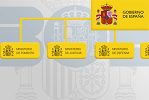Public procurement: Notification of irregularities
Content
Review of adopted decisions
To apply for a review of decisions adopted in a public procurement procedure, there are two options:
- apply to the independent administrative bodies responsible for resolving appeals in matters of public procurement;
- or apply directly to the courts, if the applicant prefers.
The Central Administrative Tribunal for Public Procurement Appeals (TACRC) is the body responsible for resolving appeals and claims in the contexts of central government, the autonomous governments and the local authorities within their territories, which have agreed to assign this competence to the TACRC.
Appeals or claims direct to the TACRC must be made by e-lodgement.
Access the proceedings in progress before the TACRC here![]() .
.
Appeals or claims can also be lodged before the contract-awarding body or at other official registries.
The autonomous governments which have no agreement with the TACRC have set up their own, independent body to resolve appeals lodged on matters of public procurement which fall within their competence.
For the administrative and judicial bodies competent for review, see the documentation governing the public procurement and the invitations to tender.
The review may lead to one of three possible outcomes:
- cancellation of the challenged decision
- repeats of parts of the procedure, brought into conformity with the law
- cancellation of the entire public procurement procedure.
Who can apply for review?
Parties with an interest in the procurement procedure may apply for review of the decision.
The concept of ‘interested party’ is broad. It includes persons whose interests or rights may be affected by the challenged decision.
Interested parties include both those who tendered and those who were unable to tender, because they found a clause of the rules governing the invitation to tender discriminatory.
Under certain conditions, trade unions and business organisations may apply for review of a decision.
Administrative appeals are optional and free of charge.
Time limits
The administrative time limits to apply for review of decisions made in the public procurement procedure are short.
The general time limit is 15 working days, and the beginning of this period depends on the challenged act:
- If the appeal is against the invitation to tender or the rules of tendering, the period begins on publication of the act on the contractor's profile.
- When the appeal is against the award, the period begins one day after e-notification of the act to the interested party.
- The period of appeal against debarments begins from when the party learned of its debarment.
Suspension of procedure:
- When an appeal is lodged against the award, the public procurement procedure is automatically suspended, and the contract cannot be entered into.
- When an appeal is lodged against other acts of the procedure, the independent body responsible for resolving the matter may decide to suspend the procedure officially or at the motion of the interested parties.
A special time limit of 30 working days applies to any objection to non-publication of the announcement or award of the contract without observing the automatic suspension of the procedure, or the suspension granted by the body responsible for resolving the matter.
Information for each Autonomous Community














Andalucía Aragón Asturias, Principado de Balears, Illes Canarias Cantabria Castilla y León Castilla-La Mancha Cataluña Ciudad de Ceuta Ciudad de Melilla Comunitat Valenciana Extremadura Galicia Madrid, Comunidad de Murcia, Región de Navarra, Comunidad Foral de País Vasco Rioja, La
Legal and/or technical references
-
Law 9/2017 of 8 November 2017 on Public Sector Contracts, transposing Directives 2014/23/EU and 2014/24/EU of the European Parliament and of the Council of 26 February 2014 into Spanish law.

-
Royal Decree-Law 3/2020 of 4 February on urgent measures incorporating into Spanish law various European Union public procurement directives in certain sectors: private insurance; pension plans and funds; taxation and tax litigation.

-
Central Administrative Tribunal for Public Procurement Appeals











